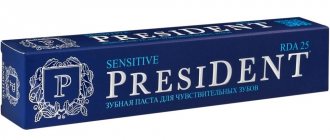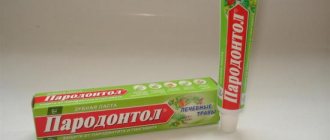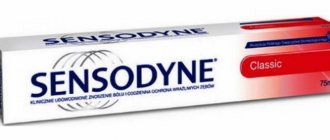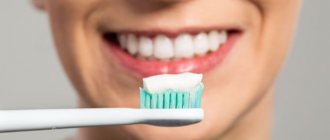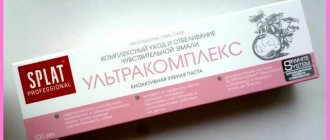Author of the article:
Soldatova Lyudmila Nikolaevna
Candidate of Medical Sciences, Professor of the Department of Clinical Dentistry of the St. Petersburg Medical and Social Institute, Chief Physician of the Alfa-Dent Dental Clinic, St. Petersburg
Tooth sensitivity is a set of symptoms that affects one third of the world's population. It is accompanied by unpleasant sensations when eating cold or hot food, and in some cases, during strong clenching of the teeth.
Causes of sensitivity
- Smoking.
- Lack or improper oral hygiene.
- Thinning of tooth enamel.
- Genetic predisposition to the disease.
- Violation of mineral metabolism in the body.
- Wrong choice of toothpaste or toothbrush.
- Frequent consumption of too hard foods.
- Lack of calcium.
- The disease can occur as a result of improper teeth whitening.
- The disease appears as a result of various dental diseases: caries, periodontitis, etc. In some cases, sensitivity may be caused by the presence of tartar or defects in fillings.
- Drinking large amounts of coffee and alcohol.
- Regular presence of acidic foods in the diet: fruits and juices.
- The habit of grinding your teeth in your sleep (bruxism).
For people who suffer from this, experienced dentists recommend using special toothpastes for sensitive teeth, for example, ASEPTA SENSITIVE toothpaste is designed specifically to care for sensitive tooth enamel.
PresiDENT Sensitive
This substance is suitable even for very vulnerable enamel. Users note that the use does not cause discomfort. Main advantages of the product:
- The degree of abrasiveness is less than 25.
- Zero abrasion of enamel when cleaning.
- No injuries to the chewing organs and gums.
- High concentration of fluorine compounds - 1350 units.
All this allows for high-quality oral care. In addition, PresiDENT Sensitive eliminates mineral deficiencies in units. The enamel becomes strong and stops wearing off quickly. The level of vulnerability is significantly reduced. The active ingredients of the product are hydroxyapatite, sodium fluoride, potassium nitrate. The paste perfectly takes care of the oral cavity, eliminating discomfort and preventing caries.
Types of pastes
The products are intended not only to eliminate the symptoms of tooth sensitivity, but also to treat dental diseases that provoke discomfort. In this regard, pastes are divided into:
- Restorative. Strengthen and regenerate enamel.
- Therapeutic toothpastes for periodontal disease. Restore gums, reduce their bleeding.
- Therapeutic toothpastes for caries. Helps prevent and treat caries in the oral cavity.
- Toothpastes with medicinal herbs. Various herbal components help fight a wide range of dental diseases.
- Complex means. Their action is aimed at solving several problems at the same time. For example, one paste may contain active ingredients to protect teeth from caries, as well as to reduce bleeding gums.
Silca Complete Sensitive
If you experience pain while eating or after eating, you most likely have increased enamel vulnerability. It is for such patients that Complete Sensitive was developed.
- Its formula provides gentle care for the affected units.
- The low abrasiveness of the substance carefully removes plaque without damaging the enamel layer.
- Potassium citrate helps reduce discomfort from sour, sweet, cold, and hot foods.
- Orange oil extract takes care of the health of gum tissue.
Do you want your crowns to be strong and your smile to be amazing? Use the Complete Sensitive product systematically!
Features of choosing toothpastes that reduce tooth sensitivity
The main purpose of using the product is to eliminate the unpleasant and painful sensations associated with tooth sensitivity. For the greatest effect, the following active components can be included in the toothpaste: potassium, calcium, zinc, fluorine, phosphorus, enzymes and biological additives, papain, fatty acids, and polydone.
Each product must meet the following parameters:
- The toothpaste must contain the elements strontium and potassium. They prevent the occurrence of irritation of nerve endings, and also narrow the lumen of the dentinal tubules. Potassium effectively protects teeth from the painful effects of external irritants (both physical and chemical).
- The most important ingredient that should be present in the product is calcium. This microelement is able to completely restore fragments of missing bone tissue. Calcium is a substance responsible for the regeneration and restoration of tooth enamel.
- There must be a sufficient amount of fluoride in the toothpaste. The optimal content of this microelement is 1400 ppm. The presence of this component activates chemical reactions with other minerals, which effectively strengthens and protects tooth enamel. However, the concentration of fluorides in the paste should not be higher than 2%.
Important! The product should not contain both fluorine and calcium. Otherwise, fluoride will displace calcium components, and the use of toothpaste will not help eliminate the unpleasant symptoms caused by tooth sensitivity. Dentists recommend using fluoride-containing toothpastes in the mornings, and products with added calcium in the evenings.
Toothpaste for sensitive teeth should not contain the following components:
- Flavoring additives and dyes. They provoke painful sensations and irritate nerve endings.
- Whitening ingredients (triclosans and whitening peroxides, whitening toothbrushes). They can aggravate the problem of tooth sensitivity and destroy the normal structure of tooth enamel.
- If a person suffers from allergies, the product should be free of parabens.
It is best to purchase toothpaste in pharmacies and only after consultation with your dentist. Before purchasing, you need to familiarize yourself with the composition of the product.
Lacalut Extra Sensitive
Such toothpastes are very popular for reducing tooth sensitivity. Its main advantage is action in several directions simultaneously.
- The mixture blocks nerve endings, which reduces pain.
- The product saturates the enamel structures with useful elements.
After use, the surface of the crowns is covered with a protective film, which remains on the chewing organs for several hours. This helps fluoride penetrate deep into the enamel. Vulnerability quickly normalizes, and the risk of developing caries decreases. In addition to the optimal fluoride content, this paste is saturated with many beneficial minerals. Among them are potassium and sodium fluoride. The composition is selected to reduce hyperesthesia.
Using toothpaste for sensitive teeth during pregnancy
During pregnancy, 90% of expectant mothers face the problem of tooth sensitivity. Toothpaste for the treatment of the disease should eliminate discomfort and not contain components that can harm the fetus. It is advisable to purchase the product only after agreement with the treating dentist.
Some manufacturers produce pastes specifically for use during pregnancy:
Advantages of these pastes:
- They do not contain ingredients that can harm the health of the mother and unborn child.
- Effectively combat the problem of tooth sensitivity.
- Prevents the appearance of plaque on tooth enamel.
- They have a pleasant refreshing effect.
- Prevents the appearance of inflammatory processes in the gums.
- They contain low-foaming components that do not allow calcium to be washed out of tooth enamel.
- They have a remineralizing effect.
Children's products for sensitive teeth
Criteria for choosing children's toothpaste:
- The fluoride concentration in the product should not exceed 1%.
- The paste should have a soft structure and not contain abrasive particles that can damage the child’s immature tooth enamel.
- It is necessary to choose a product that does not contain active chemical components. Otherwise, the baby may be poisoned or have an allergic reaction if the toothpaste is accidentally swallowed. These components include: saccharin and sodium lauryl sulfate.
- Many manufacturers make a mark on the product that allows you to choose a paste that is appropriate for the child’s age.
Tips for using toothpastes for sensitive enamel
The following recommendations are made for the correct use of the product:
- As a rule, the effect of toothpaste does not begin to appear immediately, but after two weeks of regular use. Doctors recommend not spitting out the product after brushing your teeth, but rinsing your mouth with this foamy solution for at least one minute.
- Most products are not suitable for long-term regular use, since they are low-abrasive and practically do not remove plaque from tooth enamel. In addition, toothpaste intended for sensitive teeth can mask some painful sensations in the tooth enamel, which prevents timely contact with the dentist at an early stage of the disease.
- It is not advisable to use one product for more than a month.
- It must be remembered that the use of the product will be effective only if the toothpaste is used in combination with other treatment (prescribed by a doctor).
Oral-B Sensitive Original
Today, special products are often used that have an immediate effect. This line includes Sensitive Original. The basis of the composition is hydroskiapates. This substance is an analogue of natural enamel. It perfectly strengthens crowns. The enamel layer is quickly restored. Also, the nerve endings are not irritated by external factors. If the remedy is used systematically, hyperesthesia is reduced or eliminated completely. The mixture does an excellent job of cleaning crowns from bacterial contamination and food particles, since it contains silicon dioxide. The smallest granules cope with cleaning tasks without damaging the enamel.
Clinical researches
Repeated clinical studies have proven that regular use of preventive toothpaste ASEPTA SENSITIVE for a month can reduce bleeding gums by 62%, reduce sensitivity of teeth and gums by 48% and reduce inflammation by 66%.
Sources:
- Clinical studies of antisensitive toothpaste “Asepta Sensitive” (A.A. Leontyev, O.V. Kalinina, S.B. Ulitovsky) A.A. LEONTIEV, dentist O.V. KALININA, dentist S.B. ULITOVSKY, Doctor of Medical Sciences, Prof. Department of Therapeutic Dentistry, St. Petersburg State Medical University named after. acad. I.P. Pavlova
- Study of the clinical effectiveness of the use of therapeutic and prophylactic agents of the ASEPTA series in the treatment of inflammatory periodontal diseases in children and adolescents (I.V. Klimova) Irina Vladimirovna Klimova, Candidate of Medical Sciences, Associate Professor of the Department of Pediatric Dentistry, Novosibirsk State Medical University. Department of Pediatric Dentistry, Novosibirsk State Medical University.
- Clinical and laboratory assessment of the influence of domestic therapeutic and prophylactic toothpaste based on plant extracts on the condition of the oral cavity in patients with simple marginal gingivitis. Doctor of Medical Sciences, Professor Elovikova T.M.1, Candidate of Chemical Sciences, Associate Professor Ermishina E.Yu. 2, Doctor of Technical Sciences Associate Professor Belokonova N.A. 2 Department of Therapeutic Dentistry USMU1, Department of General Chemistry USMU2

